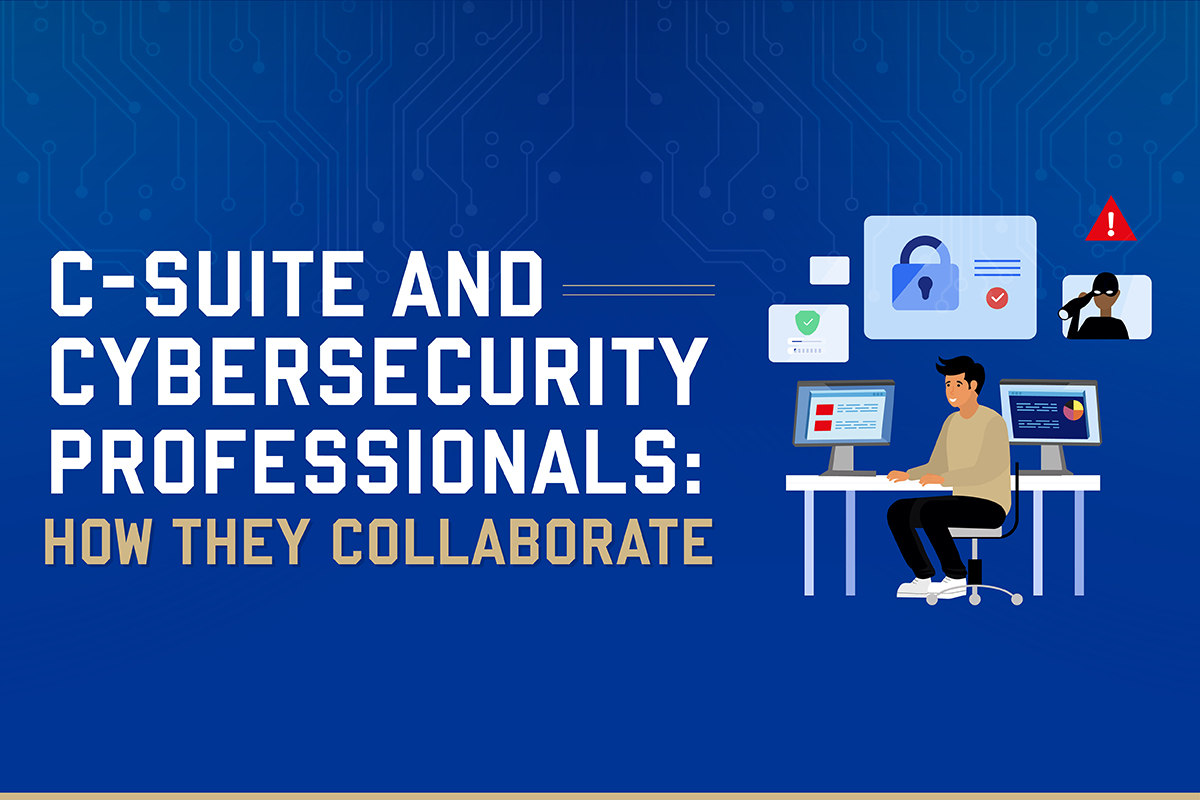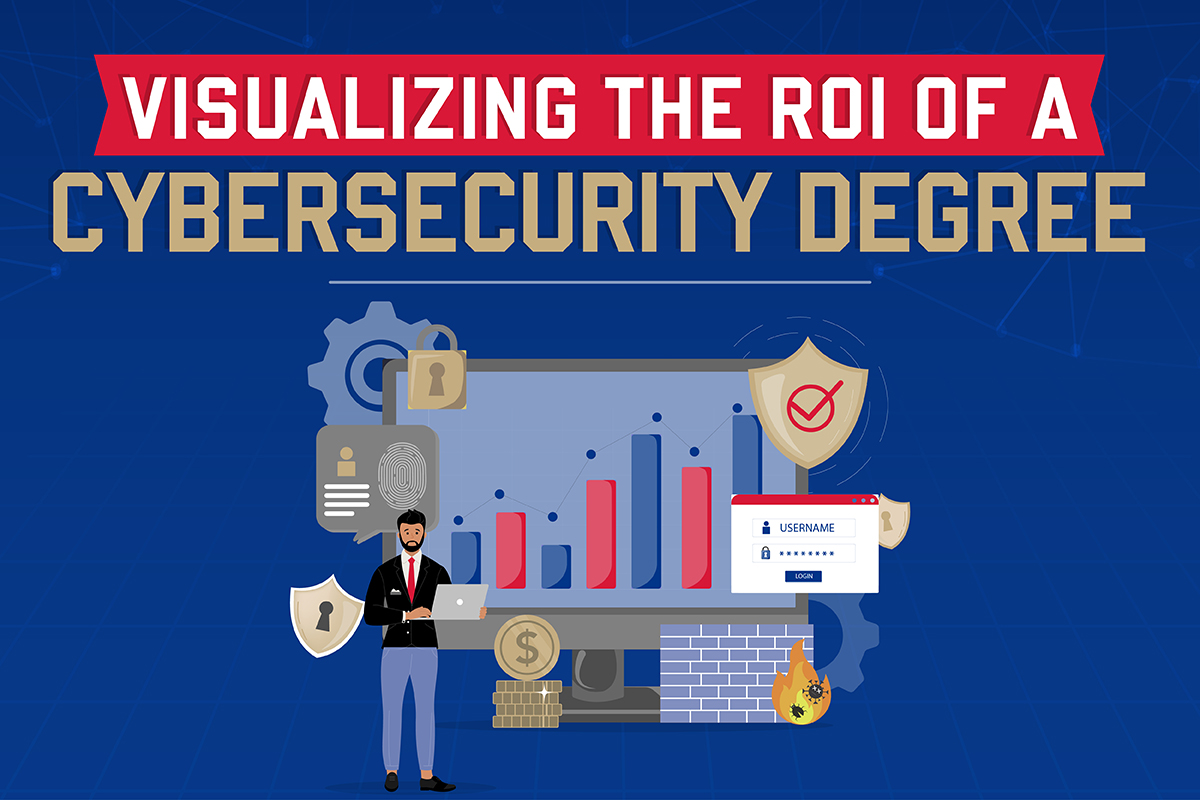Why You Should Study Cybersecurity
Written by:
University of Tulsa
• Jan 29, 2025

A single successful cyber attack can disrupt business continuity, destroy valuable data, and cost millions in lost revenue. However, many small business owners admit they lack the cybersecurity resources to prevent these very real threats.
This cybersecurity skills gap affects businesses’ bottom lines, puts personal data at risk, and presents a threat to national security. That’s why now is the ideal time for information technology (IT) and computer science professionals to transition into cybersecurity.
Organizations in the public, private, and nonprofit sectors are eager to hire well-trained IT professionals with cybersecurity skills. Whether you are considering studying cybersecurity to break into the industry, move into a leadership role, or learn more advanced technical skills, pursuing advanced cybersecurity education, such as an online Master of Science (M.S.) in Cyber Security can help you achieve your goals.
Still wondering why to study cybersecurity? Here are five reasons to consider enrolling in a cybersecurity master’s degree program.
Five Reasons to Get a Cybersecurity Education
Cybersecurity is a field rich with career opportunities. Let’s explore the main benefits of a cybersecurity career.
1. The Compensation and Benefits Are Competitive
Statista reports that worldwide reported losses connected to cybercrime were approximately $12.5B in 2023. When businesses lose money, they start to invest in risk management and mitigation solutions.
Add the increasing ubiquity of technology in our lives and cybersecurity is poised to become as important as home security. That means more jobs and potentially higher salaries for those who launch cybersecurity careers now.
According to the U.S. Bureau of Labor Statistics (BLS), information security analysts made a median salary of $120,360 in 2023. The job growth is equally impressive, with the BLS projecting information security analyst roles to increase by 33% between 2023 and 2033.
Why study cybersecurity at The University of Tulsa? Unlike other cybersecurity programs that focus purely on technical skills, the online cybersecurity master’s program at TU teaches a broad range of competencies that technical and managerial leaders need.
The online M.S. in Cyber Security curriculum covers advanced cybersecurity concepts, including wireless and Internet of Things (IoT) device security; the design and maintenance of safe, reliable, and scalable high-assurance information systems; as well as essential soft skills. As the industry expands, TU cybersecurity master’s graduates may have more opportunities to step into leadership positions in information assurance, network security, ethical hacking, and other areas.
2. Cybersecurity Is a Growing Field
Some companies have hundreds — even thousands — of internet-connected devices, and each one represents a potential point of attack for cybercriminals. As internet connectivity grows, so does the need for qualified cybersecurity professionals.
The increasing amount of sensitive data that health care, finance, and governmental organizations store internally or on cloud services is another motivation for cybersecurity investment. A recent study from Zippia found that 94% of enterprises utilize cloud services and 67% of enterprise infrastructure is currently cloud-based. Changes in the technological landscape such as these require a cybersecurity professional’s expertise and skills to oversee the transition.
3. There Are Exciting Opportunities to Specialize
You can get an entry-level cybersecurity job with just a bachelor’s degree, but you may not be able to take advantage of some of the more interesting and high-paying cybersecurity career opportunities in the field without advanced education. According to the National Initiative for Cybersecurity Careers & Studies (NICCS), there are dozens of specialty areas and more than 50 career roles in cybersecurity.
The most common job titles in the field are cybersecurity engineer, cybersecurity specialist, cybersecurity analyst, and cybersecurity architect. However, with advanced credentials, professionals can dive into niche cybersecurity subfields.
For example, penetration testers often have a specific interest in hacking. Their job as “ethical hackers” or “white-hat hackers” is to find security flaws before the bad guys do. To do this, they simulate a hack against their own systems.
Digital forensic examiners solve cyber crimes by working backward from data breaches to find the source of the theft and recover what’s been taken. Cryptographers tend to be math whizzes and spend their time cracking encryption codes via algorithms. Some professionals are drawn to the law and ethics of cybersecurity and go on to work as consultants or compliance specialists.
Why study cybersecurity at TU? To prepare learners for these and other specialized cybersecurity careers, our program offers foundational courses in cryptography, penetration testing, and cybersecurity law and policy. Students also hear from professionals in a range of cybersecurity workforce specialties via interviews and at the Tulsa Cyber Summit. A combination of didactic instruction and real-world experiences helps students decide whether they want to specialize or work in cyber-enabled jobs in other areas of the IT industry.
4. Your Work Will Make a Difference
Cybersecurity may not be the first thing that comes to mind when you think about meaningful work; however, when you consider how far-reaching the cyber-sphere is, its impact becomes tangible.
For example, health care organizations must store data on secure databases and servers after the industry suffered several devastating blows from cyber attacks. Cybersecurity experts who manage health care IT security systems protect patients’ sensitive data from HIPAA violations and malware attacks.
Cybersecurity is also an integral part of national security — one that our government leaders have made a priority. The Department of Homeland Security has said that “our daily life, economic vitality, and national security depend on a stable, safe, and resilient cyberspace.”
Cybersecurity professionals can also make the internet a safer place by helping prevent online harassment, threats, and the spread of misinformation and disinformation. If you want to use your degree to make a difference, cybersecurity skills can put you on the front lines of defense against financial, personal, and state-level attacks. Ironically, cybersecurity specialists know they’re doing a good job when no one notices the work they do.
5. There Is Vast Room for Advancement
Because the field is constantly evolving, it can be difficult to plot a specific career path for advancement in cybersecurity. Unlike careers in medicine or law, there are no hard-and-fast stepping stones for professional growth. Emerging leadership roles in cybersecurity include the following:
-
Cybersecurity manager
-
Cybersecurity architect
-
Chief Information Security Officers/CISO
-
Director of cybersecurity/information security director
Organizations in the public and private sectors are likely to create board positions and strategic teams to solidify their cyber operations, meaning the opportunities for advancement will grow accordingly.
Ambitious cybersecurity professionals must work hard, leverage their professional connections, and stay ahead of evolving trends in this rapidly changing industry to take advantage of leading-edge leadership positions as they become available.
Is Cybersecurity a Good Career for the Future?
Cybersecurity is an excellent career choice for the future, offering both long-term stability and growth opportunities. As companies increasingly rely on IT networks, cloud computing, and digital resources, the demand for skilled cybersecurity professionals continues to rise.
Here are the top reasons why a career in cybersecurity is worth considering:
-
High demand for skilled professionals: The growing frequency and sophistication of cyberattacks create an ongoing need for cybersecurity experts across all industries.
-
Job stability: Organizations cannot afford to compromise their digital infrastructure, ensuring that cybersecurity professionals are consistently in demand.
-
Lucrative salaries: Cybersecurity careers offer competitive salaries, with significant growth potential as professionals gain experience and certifications.
-
Diverse career paths: Opportunities range from ethical hacking and threat analysis to risk management and security architecture, catering to various interests and skills.
-
Rapid technological advancement: Emerging technologies like AI, IoT, and blockchain continually create new cybersecurity challenges, keeping the field dynamic and future-focused.
-
Global career opportunities: Cybersecurity is a universal need, providing professionals with the flexibility to work in different industries and countries.
-
Meaningful work: Protecting sensitive data and preventing cyberattacks plays a crucial role in maintaining societal trust and business integrity.
-
Continuous learning opportunities: The evolving nature of cyber threats ensures ongoing professional development, keeping the work engaging and intellectually stimulating.
-
Remote work flexibility: Many cybersecurity roles can be performed remotely, offering flexibility and work-life balance.
-
Growing importance of cybersecurity policies: As governments and organizations implement stricter security regulations, the demand for knowledgeable professionals to ensure compliance will increase.
What Will You Learn if You Study Cybersecurity?
There are several professional and educational pathways in cybersecurity, including degree and certificate programs, industry credentialing exams, and boot camps.
Certifications — such as the CISSP, CompTIA Security, or Network + credentials — test skills in specific areas of cybersecurity. Unlike educational programs, these certificate options do not teach anything new but, rather, verify what professionals have already learned. That’s why it’s beneficial to complete graduate-level coursework to prepare for certificate exams, which can be extremely challenging.
Boot camps are another great way to brush up on your existing cybersecurity skills or learn new ones, but they aren’t as comprehensive as degree programs. Some cybersecurity professionals pursue degrees and then enroll in boot camps or credentialing programs relevant to their specializations after graduating.
There is no academic experience that matches a master’s degree program when it comes to cybersecurity. The skills and competencies students learn in TU’s cybersecurity program prepare them to confidently enter many career roles and make a difference on day one.
How Can You Start Your Cybersecurity Education at TU?
Why study cybersecurity at TU? If you have a busy schedule and aren’t able to stop working while you earn a cybersecurity master’s degree, The University of Tulsa’s online M.S. in Cyber Security program can be a good fit for flexible learning.
The ideal candidate has professional experience in IT, computer engineering, or computer science, but this is not a requirement. If you don’t have an academic or professional background that aligns with these areas, a high GRE score and GPA can still help your M.S. in Cyber Security application stand out.
Ultimately, the value of a TU degree lies in its return on investment. The University of Tulsa has a long-standing reputation for excellence in cybersecurity with on-campus and online programs supported by the federal government, the National Security Agency, the U.S. Department of Defense, the U.S. Department of Energy, the U.S. Department of Transportation and the Defense Advanced Research Project Agency (DARPA).
TU also has relationships with industry-leading commercial employers such as Amazon and Google, giving students access to an array of career opportunities. Many alumni go on to secure high-paying jobs at industry-leading employers, including CymSTARGoogle, Instagram, and Pacific Northwest National Laboratory.
As the demand for qualified cybersecurity professionals advanced degree not only provides you with the skills necessary to thrive in the field but also shows potential employers that you have what it takes to juggle multiple responsibilities and succeed in a fast-paced environment.
Apply today to start your cybersecurity journey or attend an enrollment event to learn more about admissions requirements, tuition rates, and the online student experience at TU.
Recommended Readings
5 Blockchain Careers to Consider
How to Become an Ethical Hacker
Malware Analyst Career Overview
Sources:
CompTIA+, Boost Your Career With the Best Cybersecurity Certifications for 2024
Embroker, “Cyberattack Statistics 2024”
Monster, Your Guide to Cybersecurity Careers
Statista, “How Much Money Is Lost to Cybercrime?”
U.S. Bureau of Labor Statistics, Information Security Analysts


